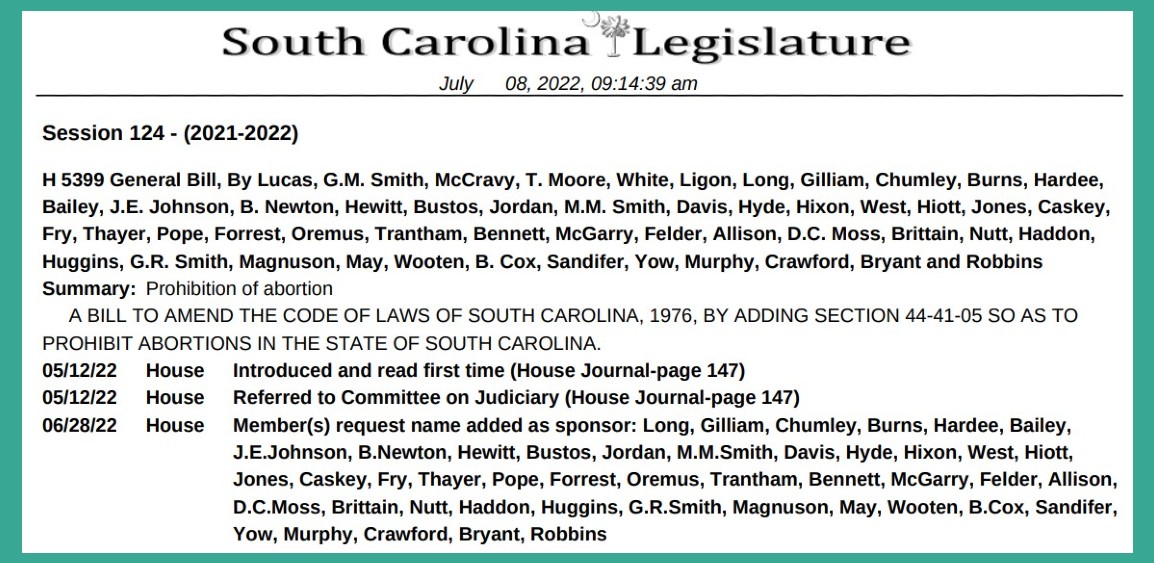
By Andy Brack | There are right ways and wrong ways to do things.
 Case in point of the wrong: A kangaroo hearing by a special S.C. House committee on Thursday to vet a strict abortion ban bill, even though there is still no language attached to the bill that people can parse or criticize. What’s more infuriating is anti-abortion religious zealots and their lemmings are pushing a complete ban without even waiting to see the consequences of a near-total ban that just went into place a few days back after the overturning of the landmark Roe v. Wade decision by the U.S. Supreme Court.
Case in point of the wrong: A kangaroo hearing by a special S.C. House committee on Thursday to vet a strict abortion ban bill, even though there is still no language attached to the bill that people can parse or criticize. What’s more infuriating is anti-abortion religious zealots and their lemmings are pushing a complete ban without even waiting to see the consequences of a near-total ban that just went into place a few days back after the overturning of the landmark Roe v. Wade decision by the U.S. Supreme Court.
The right way to do things: Have fair hearings with alternating points of view (instead of stacking the people who you agree with at the beginning) to discuss a bill that actually has language to consider. Even better: Don’t rush things now but wait for the regular legislative process in January. Because of the “fetal heartbeat” abortion ban that the state is now under, there can be virtually no abortions six weeks after inception anyway.

But since these zealots, led by GOP S.C. Rep. John McCravy III of Greenwood, don’t seem to have a reasonable bone in their bodies, perhaps it’s time for South Carolina’s reasonable people – more than 60 percent of whom support some kind of access to abortion as a vital component of women’s health care – to take to the election battlefield with a massive write-in campaign to get rid of the zealots and lemmings.
House Bill 5399 currently has 51 sponsors – all white and all Republican. Forty-two are male. Nine are female. Few of these sponsors have any real challenges in November in the general election. Why? Because they gerrymandered the hell out of their districts to keep reasonable opponents from running.
So let’s take a lesson from the late U.S. Sen. Strom Thurmond when he was a Democrat in 1954. Lots of people should run for seats as write-in candidates. If enough write-in candidates organized and ran hard on a pro-democracy platform that included government transparency, supporting a woman’s right to choose health care alternatives, economic justice for all and fairness in elections, they could make a real difference. If half of them won these independent write-in battles against the 51 GOP sponsors of the kneejerk abortion ban proposal, they would wreak havoc on the legislative system and could wrestle control of the chamber away from Republicans. Imagine independents and Democrats in South Carolina caucusing to pick the next leadership team.
Thurmond’s example is instructive. Back in 1954, U.S. Sen. Burnet Maybank Sr. of Charleston was running for election unopposed as a Democrat. But he died two months before the election. The Democratic Party, which was the only really viable game in the state then, picked state Sen. Edgar Brown, a member of the “Barnwell Ring” who ran things in the state Senate, as a candidate without a primary.
Thurmond, who had just completed a term as a Democratic governor, balked and mounted a write-in campaign. He won with 63 percent of the vote and became the first person ever to be elected to the U.S. Senate via a write-in campaign.
 On a statewide basis today, it would cost millions and be nearly impossible to mount a viable write-in campaign like Thurmond’s. But it could be far different in individual races for the S.C. House of Representatives where each member represents about 42,000 South Carolinians.
On a statewide basis today, it would cost millions and be nearly impossible to mount a viable write-in campaign like Thurmond’s. But it could be far different in individual races for the S.C. House of Representatives where each member represents about 42,000 South Carolinians.
Here’s the math: The average number of registered voters per district is about 26,600. In off-year elections, the state is lucky to get a 60% turnout, meaning the actual voting population in any district this year will be about 16,000. In turn, that translates to a simple majority of 8,000. In other words, a write-in candidate could actually win a House seat by getting 8,000 people to write in his or her name at the ballot box.
When you break it down this way, a real series of grassroots campaigns to oust the Nimrods leading the House away from [‘little-d”] democratic discussions seems more doable. Yes, it would be a lot of hard work and organizing, but what else is more important than saving our democracy from authoritarian goons?
So the real question now is how many of you have 8,000 friends?
Andy Brack is editor and publisher of Statehouse Report and the Charleston City Paper. Have a comment? Send to: feedback@statehousereport.com.



An alternative to your “massive write in” campaign strategy to protect our democracy, and bring common sense and ethical governance to our South Carolina Legislature, would be to have candidates running against incumbents from a third party that represents the principles you put forth.
South Carolina has such a party. The Alliance Party (theallianceparty.com) has full ballot access in our state. Instead of having to recruit an average of 8,000 voters to write in a candidate’s name, a simple vote for a non- duopoly candidate on the ballot would begin the change you describe.
This is one of those rare opportunities to change and improve a broken system by utilizing a component of the system.
Excellent idea. I had hoped to post to Facebook or Twitter but didn’t see that option.
By using this platform to push your own views aren’t you guilty of doing the same thing you accuse the other side of. Your calling us “religious zealots “ is offensive, we’re simply Christians who believe God’s Word. Seems to me that you are pushing an agenda and I fail to see the difference.